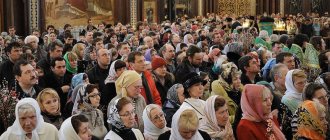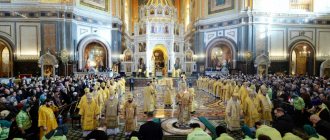Even though Russian grammar rules are taught in school, many people still make mistakes. However, as you know, a person studies all his life, and there is nothing wrong with refreshing his knowledge of the Russian language from time to time. When it comes to special words - neologisms or, conversely, archaisms, not everyone knows their correct spelling and pronunciation. Today we will analyze a religious expression, the roots and meaning of which go deep into ancient sacred texts and which has two spellings and is used in different contexts. How to say and write this phrase correctly?
Soul after death
According to Orthodox doctrine, in addition to the physical body, a person also has a spiritual, invisible essence - the soul.
It is given by God at the birth of a person in the womb and continues to exist independently after the death of the body. The posthumous fate of the soul is determined by its spiritual state. That is why the question of how to correctly wish for the Kingdom of Heaven is relevant. Life “beyond the grave” is determined by the way a person lives on earth. Did he strive for salvation, did he try to keep God’s commandments, did he repent of his sins. A pure, righteous soul carries within itself the Divine image. She is with God, to whom she longed. A soul polluted by sins is likened to demons who have fallen away from God. She cannot be close to the Lord, because she has always resisted Him. Dark forces take such a soul to themselves. After all, she was in their power even in earthly life.
One of the images of the Kingdom of Heaven (cartoon “The Extraordinary Journey of Seraphim”)
A person has freedom of choice between God and the devil only in earthly life. After death, the soul can no longer repent and change. Therefore, the main goal of earthly life in Christianity is the salvation of the soul. That is, repentance, cleansing from sin and acquiring Divine grace. Saint Ignatius (Brianchaninov) called death a great sacrament, the birth of a person “from earthly, temporary life into eternity” (“The Word on Death”). Saints in Christianity are commemorated on the day of their death. For them, death was a great and solemn event, a long-awaited union with God. Each of us should strive for this.
Examples
1. When the door opened and a coffin made of dark wood appeared, and then the yellow, terrible face of the dead man, women passing by fearfully exclaimed “The kingdom of heaven to him.”
2. The priest greeted the inconsolable relatives, went into the room where the deceased was, quietly said: “The Kingdom of Heaven” and began the funeral service.
3. According to the canons of Christianity, the Kingdom of Heaven will come after the second coming of Jesus Christ. But nowhere in the texts of the Bible is there any indication or hint given as to the time when this will happen.
How wrong
It would be wrong for a person who considers himself to be a Christian to say “rest in peace,” since this expression goes back to paganism and carries an atheistic meaning.
How to properly wish for the Kingdom of Heaven
So, after death, the soul cannot change anything on its own. But the relatives and friends of a deceased person can help his soul. To do this, you need to pray, ask God for the forgiveness of her sins.
“In life, the king’s earthly friend may intercede with him to help some condemned person. Likewise, if a person is a “friend” of God, then he can intercede with his prayer before God” (Rev. Paisius the Svyatogorets, “Words.” Volume 4).
After death, only a private, preliminary judgment of the soul occurs. It shows how deeply rooted passions are in a person’s soul and how close he was to God during his lifetime. A private court determines the soul to the “place” that most corresponds to its condition. Heaven is the afterlife with God. Hell is the absence of God. Being close to God for an unrepentant sinner would be even more unbearable than being in hell. There is no intermediate, neutral state of soul in Orthodoxy. Unlike Catholicism, which has the concept of purgatory.
However, just as in heaven there are different degrees of closeness to God, so in hell souls suffer in different ways. The final Last Judgment will occur at the end of time after the Second Coming of Christ. The prayerful care of living people can not only ease the preliminary fate of the soul. She is capable of serving as her justification at the coming terrible Judgment. Therefore, to the question of how to correctly wish the soul the Kingdom of Heaven, the answer is through church and home commemoration.
“Just as when we visit prisoners, we bring them soft drinks and the like and thereby alleviate their suffering, so we alleviate the suffering of the deceased with prayers and alms that we perform for the repose of their souls” (Reverend Paisius the Svyatogorets, “Words.” Vol. 4)
Accepted commemoration according to Orthodox canons
According to Orthodox principles, one should wish not for the body, but for the soul, eternal peace, God's mercy, forgiveness of its sins. It is considered correct to use several phrases:
- “The Kingdom of Heaven to you”: means that the person uttering this phrase believes in the eternal life of the soul, finding peace in heaven;
- “Eternal memory”: the phrase is often pronounced by atheists, agnostics and people far from the church, even if they believe in God, as well as by true Christians, it is universal, initially does not carry religious overtones, but can be used when expressing condolences to believers, i.e. ... does not violate Orthodox canons in any way;
- “Eternal rest”, an alternative version of “Rest in peace”: these short expressions can be pronounced by believers, because they know that the soul does not die, continues to exist in another form, while expressing the desire to find peace.
How to pray for the deceased
In Orthodoxy, in the first days after death, the Psalter (or the Gospel, if the deceased was a priest) is read over the body of the deceased. On the third day, the deceased is remembered with a funeral service and buried. The reading of the Psalter continues after the funeral until the 40th day. The church service for the deceased is called a memorial service. It is performed on the day of the funeral, on the third, ninth, fortieth day of death. A memorial service is also served on the anniversary of the death or birth of the deceased. The relatives of a deceased person can order his forty-day commemoration at the Divine Liturgy, which is called forty-day. During each liturgy, the remembrance of the dead is performed at the proskomedia. You can pray for the repose of your soul at home. The prayers necessary for this are in every prayer book.
The days of special remembrance of the dead in the Orthodox Church are:
- Meat Saturday (Ecumenical Parental Saturday),
- Saturdays of the 2nd, 3rd and 4th week of Great Lent,
- Radonitsa,
- May 9 (day of remembrance of slain soldiers),
- Trinity and Demetrius Saturdays,
- in Russia it is customary to commemorate the deceased on the Day of the Beheading of John the Baptist (September 11),
- and on Intercession Saturday.
Prayer for peace
You can wish the Kingdom of Heaven to the deceased with the following words:
“Rest, O Lord, the soul of Your newly departed servant (name), and forgive him all his sins, voluntary and involuntary, and grant him the Kingdom of Heaven.”
You should pray for the deceased like this:
“Rest, O Lord, the soul of Your newly departed servant (name), and forgive her all her sins, voluntary and involuntary, and grant her the Kingdom of Heaven.”
This prayer is accompanied by the sign of the cross. It must be said before eating the funeral meal. A brief commemoration of the deceased with the words “Kingdom of Heaven” with the sign of the cross is also allowed. You can also pray for the repose of the soul by reading from the prayer book “Following the departure of the soul from the body” or “Canon of prayer for the separation of the soul from the body.”
Source
“May he rest in peace” is not a remembrance
Why can’t you say “may the earth rest in peace” as a wish for the deceased? Such a wish has nothing to do with Christian commemoration. The phrase itself takes roots from paganism and implies a wish for a dead body, and not for the immortal soul of a person. But it is the fate of the soul that is most important. Therefore, Orthodox Christians should remember the deceased with home and church prayer and say: “The Kingdom of Heaven to him/her.” You can also help the deceased by giving alms for the salvation of his soul.
Christians should not accompany burials and wakes with superstitious customs. These include, for example, lowering candles, money, and various objects into the grave with the coffin. This is a pagan tradition based on the belief that material benefits can be useful to a person in the afterlife. By putting foreign objects in the coffin, people try to please the deceased. However, they forget that the soul only needs prayerful consolation. Everything material loses its meaning for her.
Funerals cannot be turned into feasts with alcohol and drunkenness. Archpriest Viktor Guzenko answers the question about alcohol at funerals:
“What good can a soul do when they drink vodka for it? A funeral dinner is a type of alms offered for the repose of the soul. And besides, from a purely human perspective, there can be an extremely unsightly picture when some of the guests are so “reminded” that they sing songs, tell jokes, and laugh when close relatives of the deceased are in grief. Both from a Christian point of view and from a human point of view, alcohol is inappropriate at a funeral.”
At a wake, there is also no need to place separate cutlery “for the deceased” or a glass of vodka in front of his portrait. And instead of wishing “rest in peace,” it is better to cross yourself and sincerely pray for the repose of the soul of the deceased.
Condolences and wishes as an important element of mourning etiquette
After the death of a person, everyone who meets his relatives shows courtesy and sincerely wishes the deceased an easy path in the transition to another life. Such words are an important part of mourning etiquette.
They allow you to partially alleviate the condition of the deceased’s loved ones or at least distract them from painful thoughts and put them in a more positive mood with kind words about the deceased.
Sometimes a simple nod of the head, a hug or silent support is all that relatives need when they lose a loved one. But this method of condolences is more acceptable for close people (blood relationship does not matter in this case). Acquaintances, colleagues, distant relatives most often express condolences in verbal form. In this case, they use template phrases, including the common one: “May you rest in peace,” addressing the deceased. A simple greeting in this case will look inappropriate and tactless.
Condolence is a form of expressing sympathy for a death
I came to my people, and they didn’t accept my people...
If you carefully read the Gospel and think about all the words of Christ about the Kingdom of God, it becomes obvious: it was this teaching that became fatal for His earthly life. The Jews longed for the Kingdom, raved about the King - but not the kind that Christ turned out to be. And the Savior was ready for this: unlike many false prophets and false messiahs, He was not at all worried about the external effect of His preaching. He knew what he was doing. And he understood perfectly well what the price is for words and what the price is for deeds. It is enough to remember how, after words about the need to eat His Body and drink His Blood as an immutable condition of life with God, many turn away from Him and leave. And so, instead of, as they would say today, “change tactics” and “make adjustments” for greater effectiveness of preaching, Christ turns to His closest disciples: “Don’t you also want to leave?”
The doctrine of the Kingdom of Heaven is key to the entire gospel narrative. From the point of view of the Jews, all this is nothing more than some kind of abstraction, in no way connected with the realities of life. Therefore, He Who so boldly dares to assert His Sonship of God - and thereby transform this “incomprehensible fiction” into Divine Revelation - must be killed, and killed shamefully, as an edification to all others, so that no one would be bothered to try to destroy what they believed Old Testament Jews - preserved the authenticity and integrity of the Jewish people for centuries. Who else, besides the Jews, perfectly understood and remembered what the Kingdom was? Saul, David, Solomon - all of them were inscribed in the history of the Jewish people not only as kings, saints and prophets, but also as builders of that very kingdom, through the ruins of which this newly minted Prophet now walks and tells strange things about the Heavenly or Divine Kingdom!
Christ's questioners - Jews - are very specific people in their attitude to everything that concerns areas of life that are important to them. The rich experience of survival in a hostile environment taught them exceptional pragmatism, and the complex institutions of the Mosaic Law delicately honed this ability for a quick rational response from generation to generation.
And when you read how they listen to Christ’s words about the Kingdom, you get the feeling that this incessant aggressive background of questions is literally ringing in the air: “Where is this Kingdom, show it to us! When will this Kingdom come? And what can you compare it to, how can you touch it, touch it, see it? Isn't this all a bluff? »
And the Answer was before their eyes, walking, talking, healing the sick. Only later, after the Resurrection, will the Apostle John remember with a deep feeling of sincere amazement - how they could see Him, the Word of Life, the Son of God, with their eyes, touch with their hands, eat, drink with Him. This is difficult to fit into the consciousness of even His closest disciples - those who saw Him Risen. What then can we say about those who looked at this wandering preacher like that, out of the corner of their eye, casually - there are many of them walking around here.
Heaven or Christ?
A Christian is not one who lives the dream of going to heaven, but one who lives by Christ. For a believer in Christ, heaven both opens and can close already in this life. Therefore, for him, every day, every minute of this seemingly transient and therefore meaningless life is actually priceless. And the “mechanical” placement of the soul, not transformed by Divine grace, in a place where the righteous and saints live, will not change the quality of life: there is no escape from oneself, and the one who carries the hell of pride and passions in his heart will himself run away with contempt and anger at these "saints" and "hypocrites".
Without becoming a subject of the Kingdom of God here on earth, there is too little chance of getting into it after death. Looking for Christ, His closeness, His tangible presence - not only in the temple and sacraments, but also in the daily events of life - is not such a difficult task if you hear His commandments and try to fulfill them. But in reality there is only one commandment: to be imitators of Christ, to live and be inspired by Him, to act as He acted; to think as He thought, to desire what He strove for. Strange as it may sound, today we must speak loudly about this, again and again: Christianity is Christ-centered, or, even worse, “sin-centric.”
For us, heaven is where Christ is, and not the other way around.
And His Kingdom - whatever you call it - God's or Heavenly - is already here on earth, with us, among us. If only we ourselves - in our hearts, in thoughts, words and deeds - are with Christ.
Vertical or horizontal?
When we talk about the Kingdom of Heaven, we are immediately confused by its “heavenliness,” which is subconsciously perceived by us as something not entirely real, exclusively spiritual, or at least unearthly or beyond the grave.
However, in the gospel texts, “Heaven” is a synonym for the name of God, and, accordingly, the “Kingdom of Heaven” is nothing more than His, God’s, rule on Earth - and nothing more. But this is such a living and real presence of God in human life that it turns out to be the very pearl for which everything else is easily sold and forgotten.
The Kingdom of Heaven is infinitely far from the state of “spiritual comfort” or “pocket God in the soul,” which our contemporaries so love to justify their practical godlessness. Here God comes to man precisely as a King, a Master - and this revelation cannot be confused or imitated. A king cannot exist without his subjects: in the same way, the Kingdom of Heaven appears only where a meeting between man and God takes place - a meeting, the result of which is a new life for this person.
The Kingdom of Heaven is not food and drink, not power and might, not contentment and wealth. All this is a horizontal plane: and at any point in this space a new reality can appear - a vertical, which is built only between God and man.
The Kingdom of God is already here, among you, Christ says to His disciples: they look around in amazement, looking around, not understanding that they just need to see themselves next to Christ. There is no need to look for this Kingdom either in time or in space - it is always nearby.
But Christ is meek and long-suffering, He does not break into the soul as an Imperious Master, but stands at the door and only modestly knocks in the hope that those outside the door, inside, will hear and want to let in. Hence the abundance in His speech of images and comparisons that help to understand His teaching about the Kingdom. And at the same time there is a constant emphasis: “Yes, I am the King, but not of the Kingdom that you all dream of. My Kingdom is different. It is where there are not the power-hungry and the proud, but the meek and modest; where there is no pomp and religious hypocrisy, but childish simplicity and sincerity; where God is not a mental fiction, but a Living Lord, really present in life!” It is not difficult to imagine how difficult these words were to hear: just look around - who is to blame for our troubles today? The powers that be? Thieves and bribe takers? But what difference does it make - all the same, the gaze glides along the path worn over centuries, and long before Christ this path had already been trodden. To paraphrase Christ’s words about the Kingdom of God, one could say this: no matter what kind of ruler you install, even the most holy, sinless and full of all virtues, this will not solve the essence of our problems: after all, our main enemy is not somewhere outside, he is inside; more precisely, we are our own enemies number one.











